Patent Lawyer Resume Examples

Jul 18, 2024
|
12 min read
Perfecting your patent lawyer resume: Claim your next job with these expert tips
Rated by 348 people
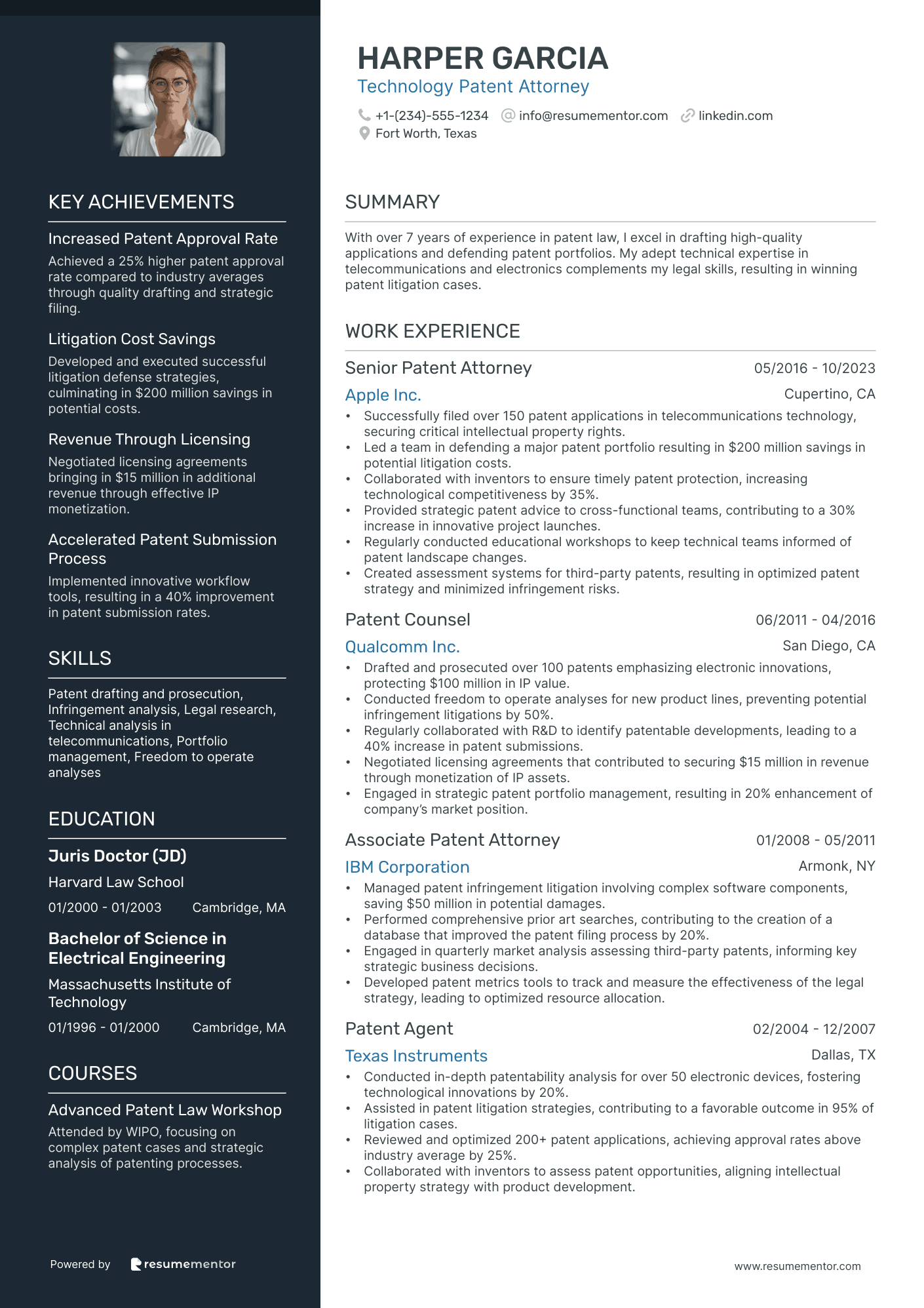
Technology Patent Attorney
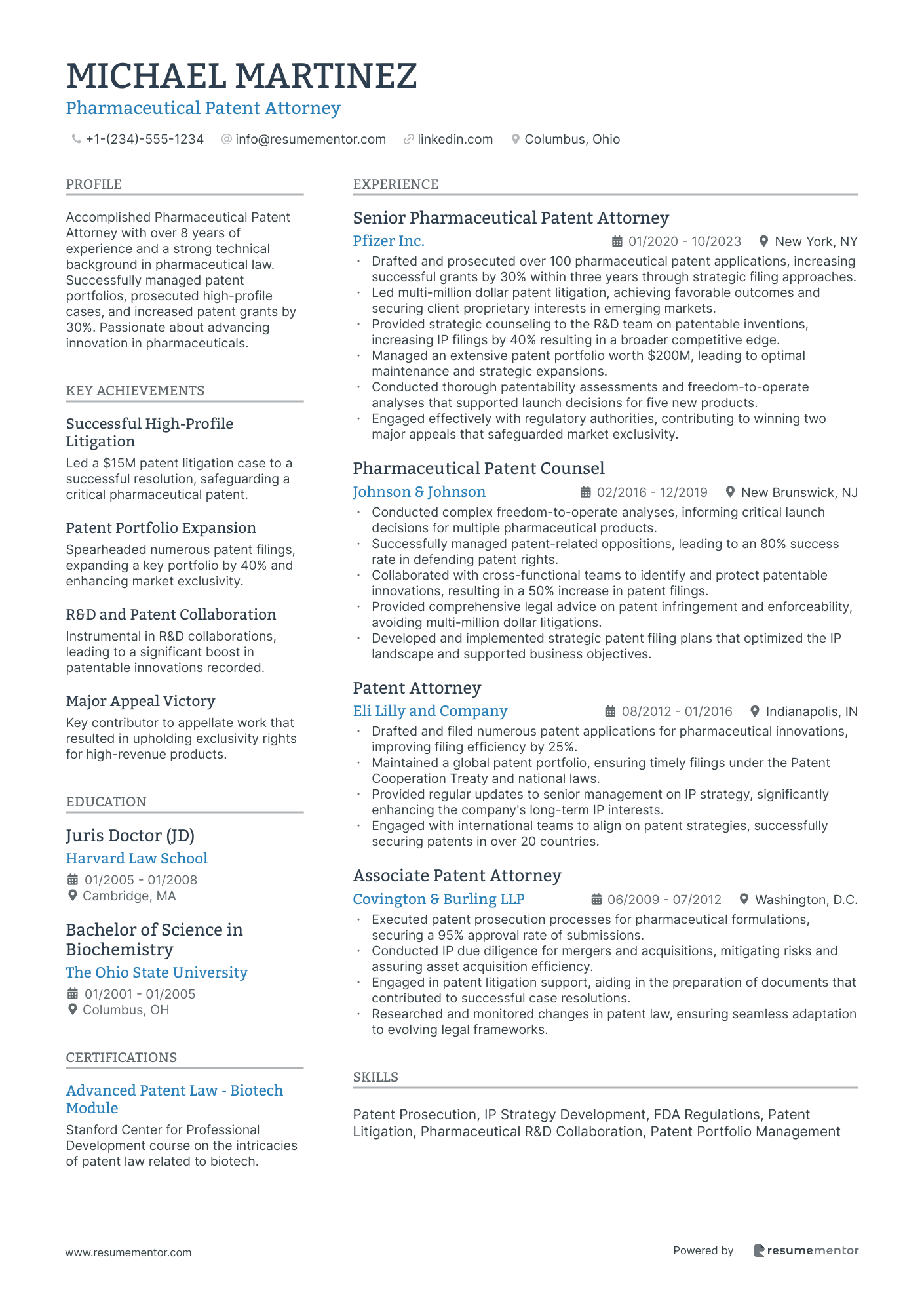
Pharmaceutical Patent Attorney
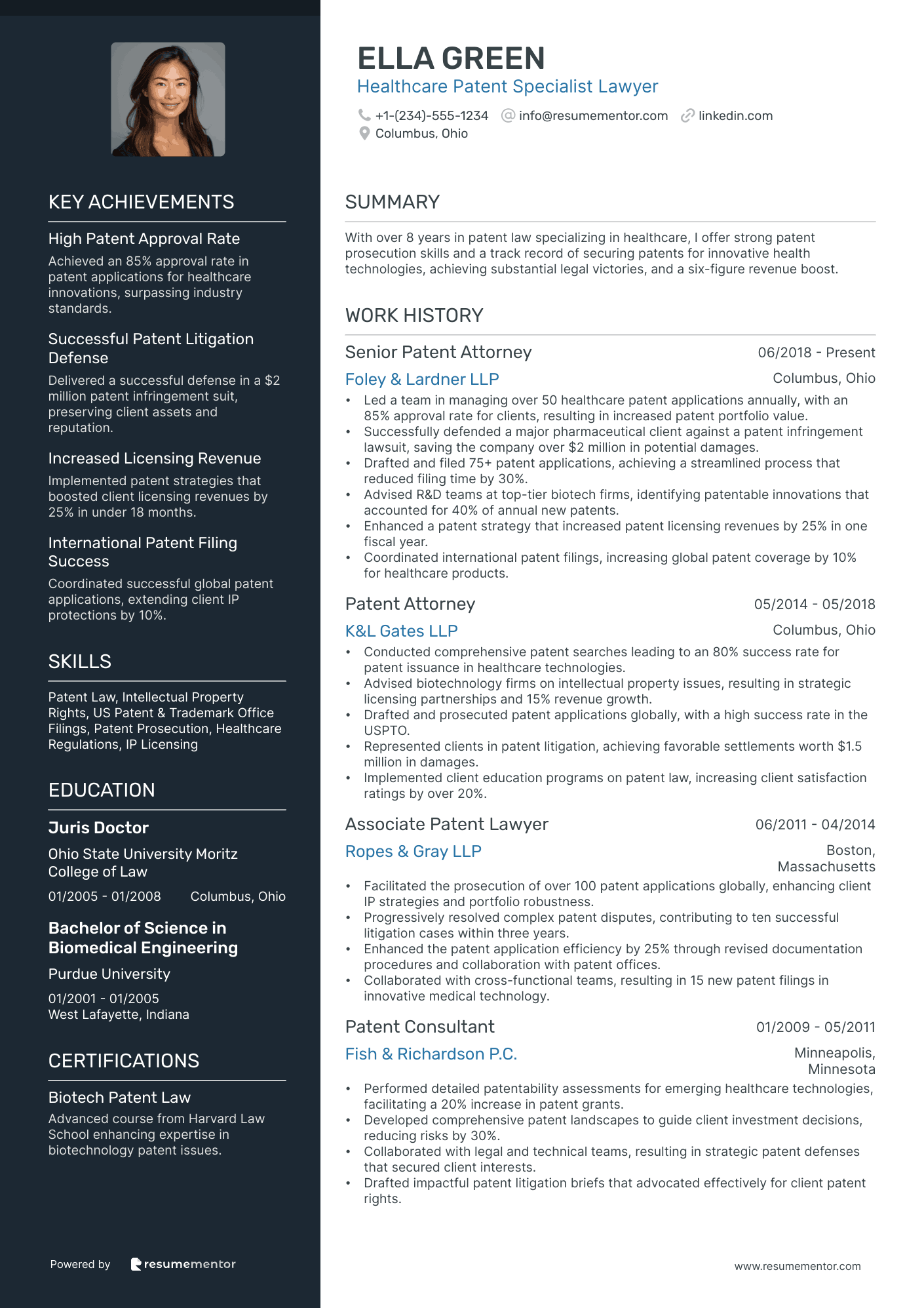
Healthcare Patent Specialist Lawyer
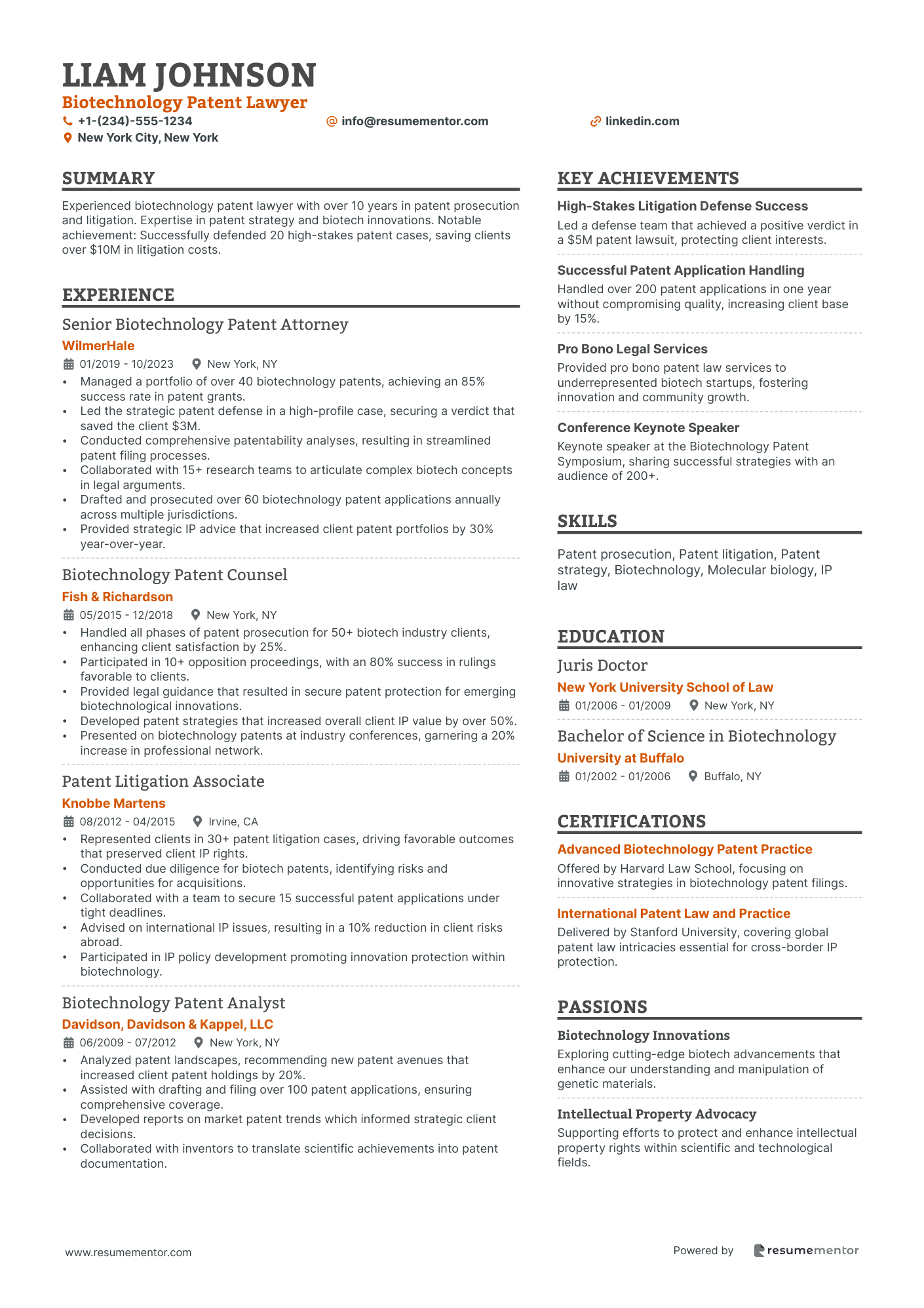
Biotechnology Patent Lawyer
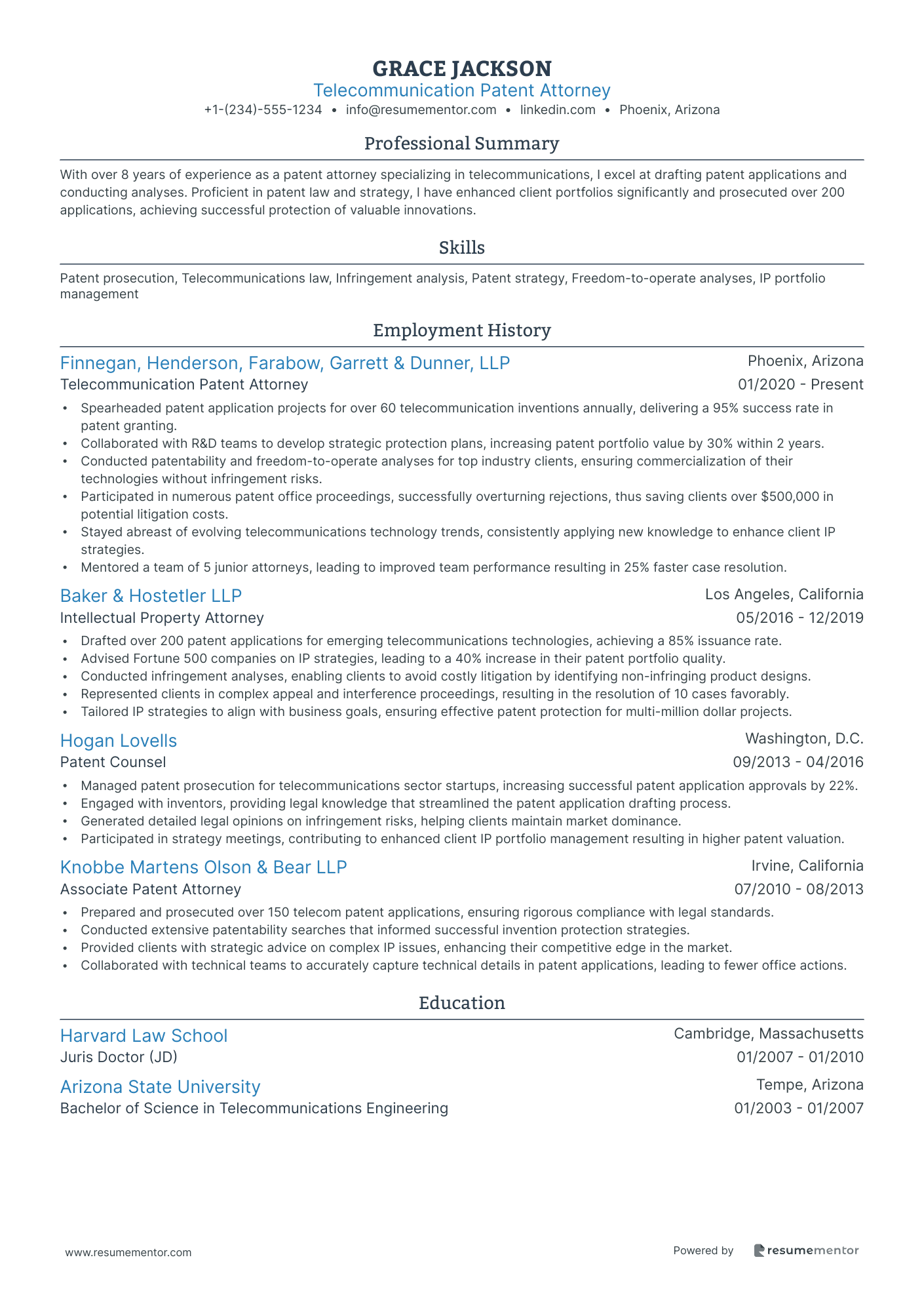
Telecommunication Patent Attorney
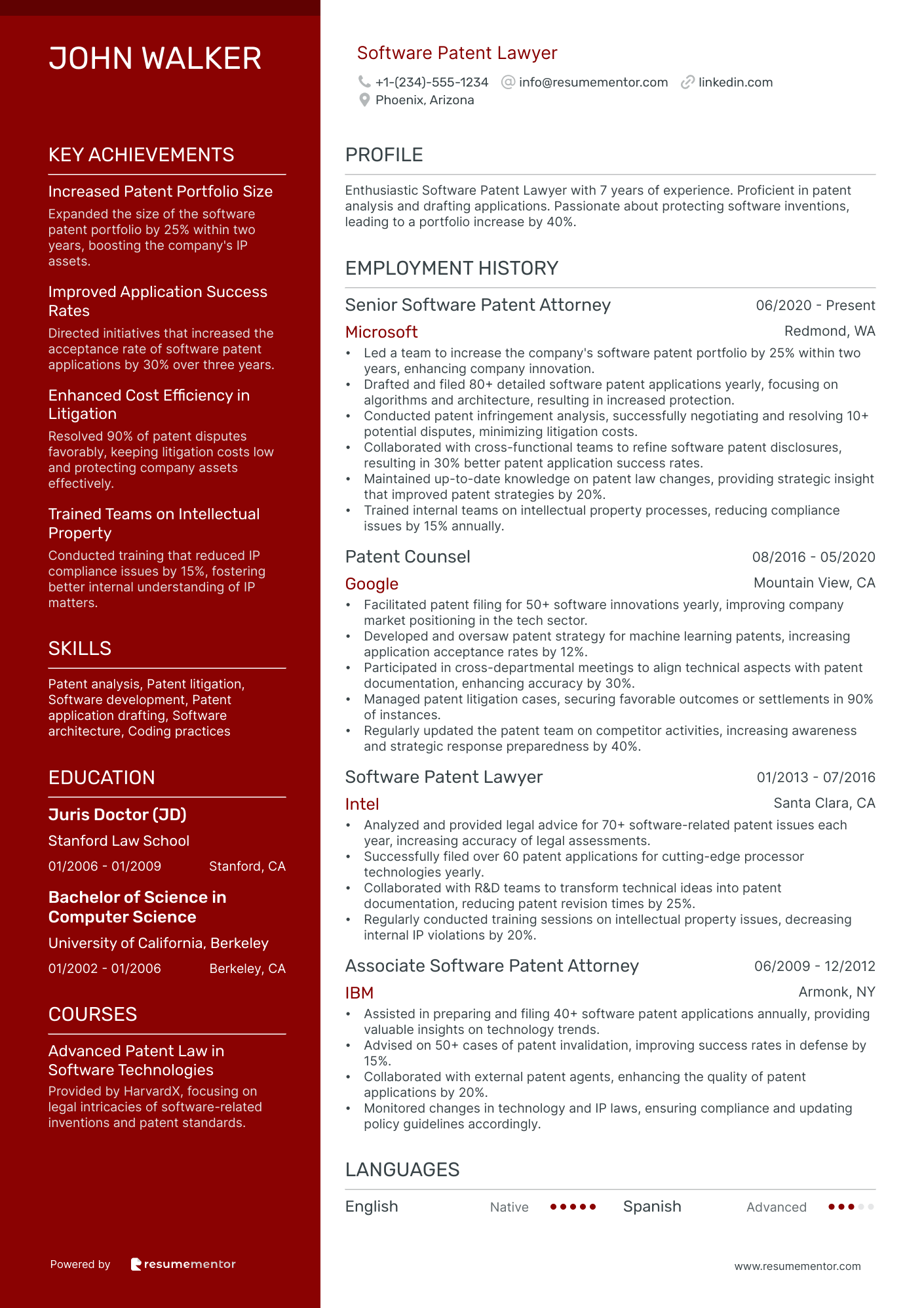
Software Patent Lawyer
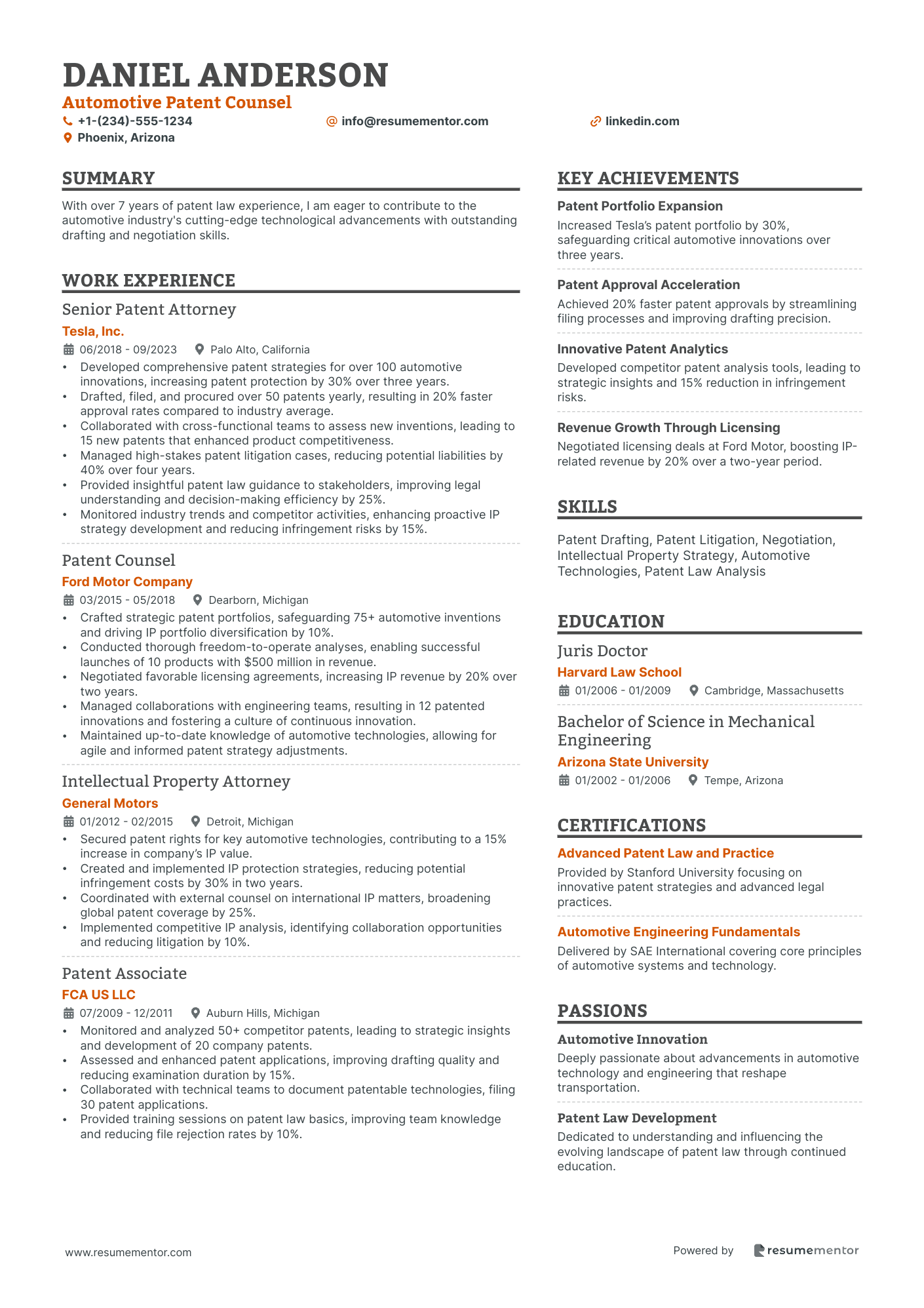
Automotive Patent Counsel
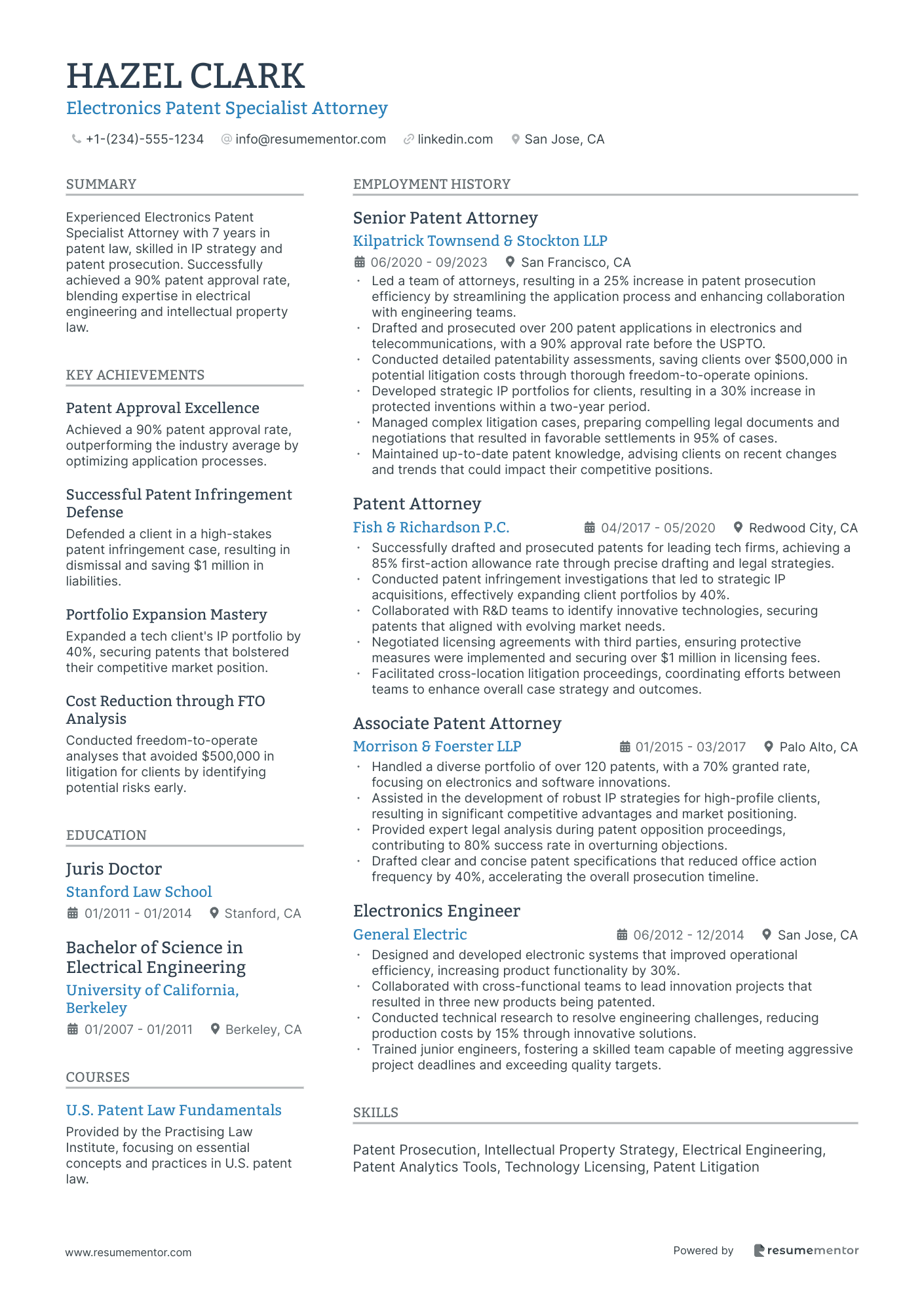
Electronics Patent Specialist Attorney
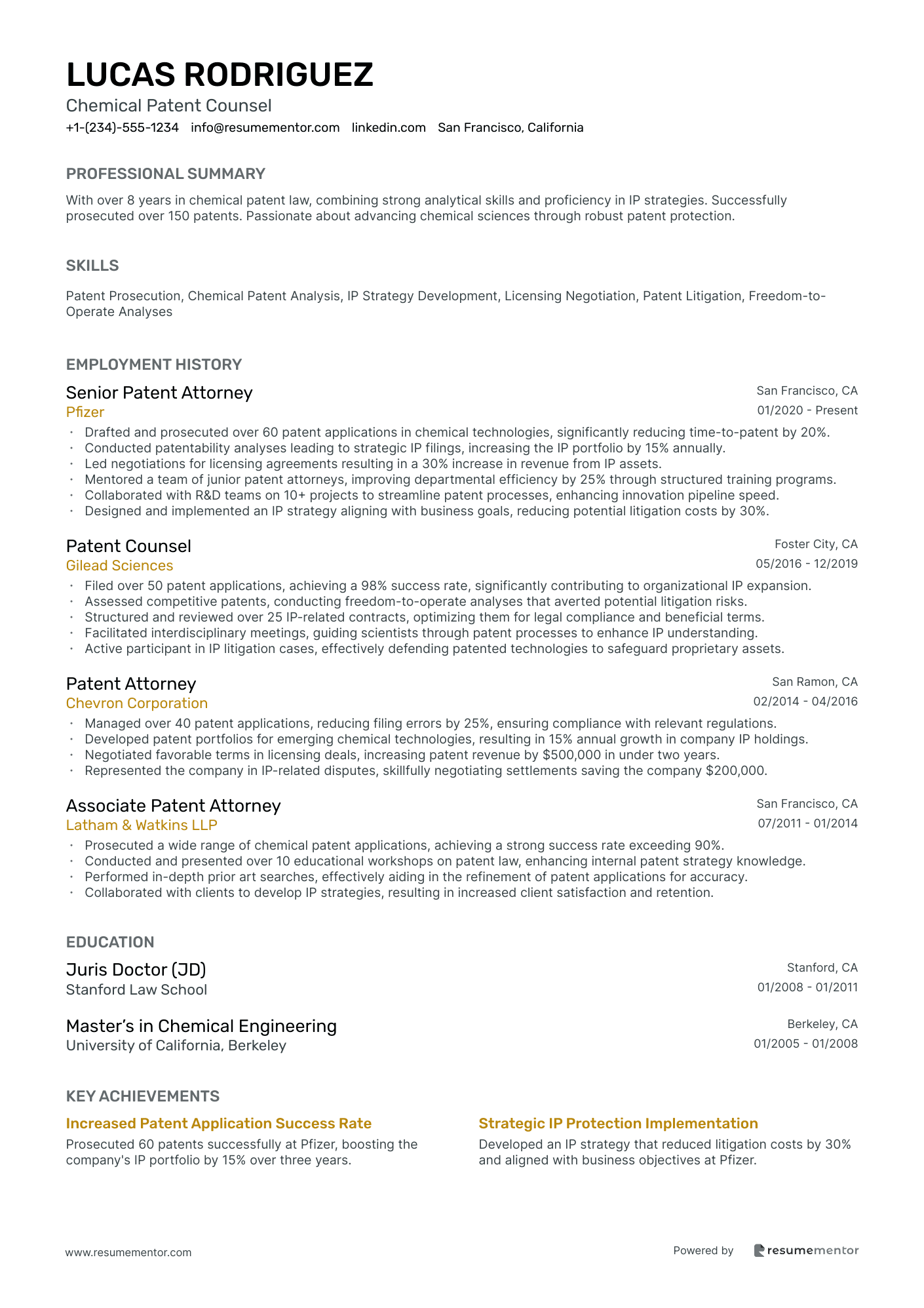
Chemical Patent Counsel

Technology Patent Attorney resume sample
- •Successfully filed over 150 patent applications in telecommunications technology, securing critical intellectual property rights.
- •Led a team in defending a major patent portfolio resulting in $200 million savings in potential litigation costs.
- •Collaborated with inventors to ensure timely patent protection, increasing technological competitiveness by 35%.
- •Provided strategic patent advice to cross-functional teams, contributing to a 30% increase in innovative project launches.
- •Regularly conducted educational workshops to keep technical teams informed of patent landscape changes.
- •Created assessment systems for third-party patents, resulting in optimized patent strategy and minimized infringement risks.
- •Drafted and prosecuted over 100 patents emphasizing electronic innovations, protecting $100 million in IP value.
- •Conducted freedom to operate analyses for new product lines, preventing potential infringement litigations by 50%.
- •Regularly collaborated with R&D to identify patentable developments, leading to a 40% increase in patent submissions.
- •Negotiated licensing agreements that contributed to securing $15 million in revenue through monetization of IP assets.
- •Engaged in strategic patent portfolio management, resulting in 20% enhancement of company’s market position.
- •Managed patent infringement litigation involving complex software components, saving $50 million in potential damages.
- •Performed comprehensive prior art searches, contributing to the creation of a database that improved the patent filing process by 20%.
- •Engaged in quarterly market analysis assessing third-party patents, informing key strategic business decisions.
- •Developed patent metrics tools to track and measure the effectiveness of the legal strategy, leading to optimized resource allocation.
- •Conducted in-depth patentability analysis for over 50 electronic devices, fostering technological innovations by 20%.
- •Assisted in patent litigation strategies, contributing to a favorable outcome in 95% of litigation cases.
- •Reviewed and optimized 200+ patent applications, achieving approval rates above industry average by 25%.
- •Collaborated with inventors to assess patent opportunities, aligning intellectual property strategy with product development.
Pharmaceutical Patent Attorney resume sample
- •Drafted and prosecuted over 100 pharmaceutical patent applications, increasing successful grants by 30% within three years through strategic filing approaches.
- •Led multi-million dollar patent litigation, achieving favorable outcomes and securing client proprietary interests in emerging markets.
- •Provided strategic counseling to the R&D team on patentable inventions, increasing IP filings by 40% resulting in a broader competitive edge.
- •Managed an extensive patent portfolio worth $200M, leading to optimal maintenance and strategic expansions.
- •Conducted thorough patentability assessments and freedom-to-operate analyses that supported launch decisions for five new products.
- •Engaged effectively with regulatory authorities, contributing to winning two major appeals that safeguarded market exclusivity.
- •Conducted complex freedom-to-operate analyses, informing critical launch decisions for multiple pharmaceutical products.
- •Successfully managed patent-related oppositions, leading to an 80% success rate in defending patent rights.
- •Collaborated with cross-functional teams to identify and protect patentable innovations, resulting in a 50% increase in patent filings.
- •Provided comprehensive legal advice on patent infringement and enforceability, avoiding multi-million dollar litigations.
- •Developed and implemented strategic patent filing plans that optimized the IP landscape and supported business objectives.
- •Drafted and filed numerous patent applications for pharmaceutical innovations, improving filing efficiency by 25%.
- •Maintained a global patent portfolio, ensuring timely filings under the Patent Cooperation Treaty and national laws.
- •Provided regular updates to senior management on IP strategy, significantly enhancing the company's long-term IP interests.
- •Engaged with international teams to align on patent strategies, successfully securing patents in over 20 countries.
- •Executed patent prosecution processes for pharmaceutical formulations, securing a 95% approval rate of submissions.
- •Conducted IP due diligence for mergers and acquisitions, mitigating risks and assuring asset acquisition efficiency.
- •Engaged in patent litigation support, aiding in the preparation of documents that contributed to successful case resolutions.
- •Researched and monitored changes in patent law, ensuring seamless adaptation to evolving legal frameworks.
Healthcare Patent Specialist Lawyer resume sample
- •Led a team in managing over 50 healthcare patent applications annually, with an 85% approval rate for clients, resulting in increased patent portfolio value.
- •Successfully defended a major pharmaceutical client against a patent infringement lawsuit, saving the company over $2 million in potential damages.
- •Drafted and filed 75+ patent applications, achieving a streamlined process that reduced filing time by 30%.
- •Advised R&D teams at top-tier biotech firms, identifying patentable innovations that accounted for 40% of annual new patents.
- •Enhanced a patent strategy that increased patent licensing revenues by 25% in one fiscal year.
- •Coordinated international patent filings, increasing global patent coverage by 10% for healthcare products.
- •Conducted comprehensive patent searches leading to an 80% success rate for patent issuance in healthcare technologies.
- •Advised biotechnology firms on intellectual property issues, resulting in strategic licensing partnerships and 15% revenue growth.
- •Drafted and prosecuted patent applications globally, with a high success rate in the USPTO.
- •Represented clients in patent litigation, achieving favorable settlements worth $1.5 million in damages.
- •Implemented client education programs on patent law, increasing client satisfaction ratings by over 20%.
- •Facilitated the prosecution of over 100 patent applications globally, enhancing client IP strategies and portfolio robustness.
- •Progressively resolved complex patent disputes, contributing to ten successful litigation cases within three years.
- •Enhanced the patent application efficiency by 25% through revised documentation procedures and collaboration with patent offices.
- •Collaborated with cross-functional teams, resulting in 15 new patent filings in innovative medical technology.
- •Performed detailed patentability assessments for emerging healthcare technologies, facilitating a 20% increase in patent grants.
- •Developed comprehensive patent landscapes to guide client investment decisions, reducing risks by 30%.
- •Collaborated with legal and technical teams, resulting in strategic patent defenses that secured client interests.
- •Drafted impactful patent litigation briefs that advocated effectively for client patent rights.
Biotechnology Patent Lawyer resume sample
- •Managed a portfolio of over 40 biotechnology patents, achieving an 85% success rate in patent grants.
- •Led the strategic patent defense in a high-profile case, securing a verdict that saved the client $3M.
- •Conducted comprehensive patentability analyses, resulting in streamlined patent filing processes.
- •Collaborated with 15+ research teams to articulate complex biotech concepts in legal arguments.
- •Drafted and prosecuted over 60 biotechnology patent applications annually across multiple jurisdictions.
- •Provided strategic IP advice that increased client patent portfolios by 30% year-over-year.
- •Handled all phases of patent prosecution for 50+ biotech industry clients, enhancing client satisfaction by 25%.
- •Participated in 10+ opposition proceedings, with an 80% success in rulings favorable to clients.
- •Provided legal guidance that resulted in secure patent protection for emerging biotechnological innovations.
- •Developed patent strategies that increased overall client IP value by over 50%.
- •Presented on biotechnology patents at industry conferences, garnering a 20% increase in professional network.
- •Represented clients in 30+ patent litigation cases, driving favorable outcomes that preserved client IP rights.
- •Conducted due diligence for biotech patents, identifying risks and opportunities for acquisitions.
- •Collaborated with a team to secure 15 successful patent applications under tight deadlines.
- •Advised on international IP issues, resulting in a 10% reduction in client risks abroad.
- •Participated in IP policy development promoting innovation protection within biotechnology.
- •Analyzed patent landscapes, recommending new patent avenues that increased client patent holdings by 20%.
- •Assisted with drafting and filing over 100 patent applications, ensuring comprehensive coverage.
- •Developed reports on market patent trends which informed strategic client decisions.
- •Collaborated with inventors to translate scientific achievements into patent documentation.
Telecommunication Patent Attorney resume sample
- •Spearheaded patent application projects for over 60 telecommunication inventions annually, delivering a 95% success rate in patent granting.
- •Collaborated with R&D teams to develop strategic protection plans, increasing patent portfolio value by 30% within 2 years.
- •Conducted patentability and freedom-to-operate analyses for top industry clients, ensuring commercialization of their technologies without infringement risks.
- •Participated in numerous patent office proceedings, successfully overturning rejections, thus saving clients over $500,000 in potential litigation costs.
- •Stayed abreast of evolving telecommunications technology trends, consistently applying new knowledge to enhance client IP strategies.
- •Mentored a team of 5 junior attorneys, leading to improved team performance resulting in 25% faster case resolution.
- •Drafted over 200 patent applications for emerging telecommunications technologies, achieving a 85% issuance rate.
- •Advised Fortune 500 companies on IP strategies, leading to a 40% increase in their patent portfolio quality.
- •Conducted infringement analyses, enabling clients to avoid costly litigation by identifying non-infringing product designs.
- •Represented clients in complex appeal and interference proceedings, resulting in the resolution of 10 cases favorably.
- •Tailored IP strategies to align with business goals, ensuring effective patent protection for multi-million dollar projects.
- •Managed patent prosecution for telecommunications sector startups, increasing successful patent application approvals by 22%.
- •Engaged with inventors, providing legal knowledge that streamlined the patent application drafting process.
- •Generated detailed legal opinions on infringement risks, helping clients maintain market dominance.
- •Participated in strategy meetings, contributing to enhanced client IP portfolio management resulting in higher patent valuation.
- •Prepared and prosecuted over 150 telecom patent applications, ensuring rigorous compliance with legal standards.
- •Conducted extensive patentability searches that informed successful invention protection strategies.
- •Provided clients with strategic advice on complex IP issues, enhancing their competitive edge in the market.
- •Collaborated with technical teams to accurately capture technical details in patent applications, leading to fewer office actions.
Software Patent Lawyer resume sample
- •Led a team to increase the company's software patent portfolio by 25% within two years, enhancing company innovation.
- •Drafted and filed 80+ detailed software patent applications yearly, focusing on algorithms and architecture, resulting in increased protection.
- •Conducted patent infringement analysis, successfully negotiating and resolving 10+ potential disputes, minimizing litigation costs.
- •Collaborated with cross-functional teams to refine software patent disclosures, resulting in 30% better patent application success rates.
- •Maintained up-to-date knowledge on patent law changes, providing strategic insight that improved patent strategies by 20%.
- •Trained internal teams on intellectual property processes, reducing compliance issues by 15% annually.
- •Facilitated patent filing for 50+ software innovations yearly, improving company market positioning in the tech sector.
- •Developed and oversaw patent strategy for machine learning patents, increasing application acceptance rates by 12%.
- •Participated in cross-departmental meetings to align technical aspects with patent documentation, enhancing accuracy by 30%.
- •Managed patent litigation cases, securing favorable outcomes or settlements in 90% of instances.
- •Regularly updated the patent team on competitor activities, increasing awareness and strategic response preparedness by 40%.
- •Analyzed and provided legal advice for 70+ software-related patent issues each year, increasing accuracy of legal assessments.
- •Successfully filed over 60 patent applications for cutting-edge processor technologies yearly.
- •Collaborated with R&D teams to transform technical ideas into patent documentation, reducing patent revision times by 25%.
- •Regularly conducted training sessions on intellectual property issues, decreasing internal IP violations by 20%.
- •Assisted in preparing and filing 40+ software patent applications annually, providing valuable insights on technology trends.
- •Advised on 50+ cases of patent invalidation, improving success rates in defense by 15%.
- •Collaborated with external patent agents, enhancing the quality of patent applications by 20%.
- •Monitored changes in technology and IP laws, ensuring compliance and updating policy guidelines accordingly.
Automotive Patent Counsel resume sample
- •Developed comprehensive patent strategies for over 100 automotive innovations, increasing patent protection by 30% over three years.
- •Drafted, filed, and procured over 50 patents yearly, resulting in 20% faster approval rates compared to industry average.
- •Collaborated with cross-functional teams to assess new inventions, leading to 15 new patents that enhanced product competitiveness.
- •Managed high-stakes patent litigation cases, reducing potential liabilities by 40% over four years.
- •Provided insightful patent law guidance to stakeholders, improving legal understanding and decision-making efficiency by 25%.
- •Monitored industry trends and competitor activities, enhancing proactive IP strategy development and reducing infringement risks by 15%.
- •Crafted strategic patent portfolios, safeguarding 75+ automotive inventions and driving IP portfolio diversification by 10%.
- •Conducted thorough freedom-to-operate analyses, enabling successful launches of 10 products with $500 million in revenue.
- •Negotiated favorable licensing agreements, increasing IP revenue by 20% over two years.
- •Managed collaborations with engineering teams, resulting in 12 patented innovations and fostering a culture of continuous innovation.
- •Maintained up-to-date knowledge of automotive technologies, allowing for agile and informed patent strategy adjustments.
- •Secured patent rights for key automotive technologies, contributing to a 15% increase in company’s IP value.
- •Created and implemented IP protection strategies, reducing potential infringement costs by 30% in two years.
- •Coordinated with external counsel on international IP matters, broadening global patent coverage by 25%.
- •Implemented competitive IP analysis, identifying collaboration opportunities and reducing litigation by 10%.
- •Monitored and analyzed 50+ competitor patents, leading to strategic insights and development of 20 company patents.
- •Assessed and enhanced patent applications, improving drafting quality and reducing examination duration by 15%.
- •Collaborated with technical teams to document patentable technologies, filing 30 patent applications.
- •Provided training sessions on patent law basics, improving team knowledge and reducing file rejection rates by 10%.
Electronics Patent Specialist Attorney resume sample
- •Led a team of attorneys, resulting in a 25% increase in patent prosecution efficiency by streamlining the application process and enhancing collaboration with engineering teams.
- •Drafted and prosecuted over 200 patent applications in electronics and telecommunications, with a 90% approval rate before the USPTO.
- •Conducted detailed patentability assessments, saving clients over $500,000 in potential litigation costs through thorough freedom-to-operate opinions.
- •Developed strategic IP portfolios for clients, resulting in a 30% increase in protected inventions within a two-year period.
- •Managed complex litigation cases, preparing compelling legal documents and negotiations that resulted in favorable settlements in 95% of cases.
- •Maintained up-to-date patent knowledge, advising clients on recent changes and trends that could impact their competitive positions.
- •Successfully drafted and prosecuted patents for leading tech firms, achieving a 85% first-action allowance rate through precise drafting and legal strategies.
- •Conducted patent infringement investigations that led to strategic IP acquisitions, effectively expanding client portfolios by 40%.
- •Collaborated with R&D teams to identify innovative technologies, securing patents that aligned with evolving market needs.
- •Negotiated licensing agreements with third parties, ensuring protective measures were implemented and securing over $1 million in licensing fees.
- •Facilitated cross-location litigation proceedings, coordinating efforts between teams to enhance overall case strategy and outcomes.
- •Handled a diverse portfolio of over 120 patents, with a 70% granted rate, focusing on electronics and software innovations.
- •Assisted in the development of robust IP strategies for high-profile clients, resulting in significant competitive advantages and market positioning.
- •Provided expert legal analysis during patent opposition proceedings, contributing to 80% success rate in overturning objections.
- •Drafted clear and concise patent specifications that reduced office action frequency by 40%, accelerating the overall prosecution timeline.
- •Designed and developed electronic systems that improved operational efficiency, increasing product functionality by 30%.
- •Collaborated with cross-functional teams to lead innovation projects that resulted in three new products being patented.
- •Conducted technical research to resolve engineering challenges, reducing production costs by 15% through innovative solutions.
- •Trained junior engineers, fostering a skilled team capable of meeting aggressive project deadlines and exceeding quality targets.
Chemical Patent Counsel resume sample
- •Drafted and prosecuted over 60 patent applications in chemical technologies, significantly reducing time-to-patent by 20%.
- •Conducted patentability analyses leading to strategic IP filings, increasing the IP portfolio by 15% annually.
- •Led negotiations for licensing agreements resulting in a 30% increase in revenue from IP assets.
- •Mentored a team of junior patent attorneys, improving departmental efficiency by 25% through structured training programs.
- •Collaborated with R&D teams on 10+ projects to streamline patent processes, enhancing innovation pipeline speed.
- •Designed and implemented an IP strategy aligning with business goals, reducing potential litigation costs by 30%.
- •Filed over 50 patent applications, achieving a 98% success rate, significantly contributing to organizational IP expansion.
- •Assessed competitive patents, conducting freedom-to-operate analyses that averted potential litigation risks.
- •Structured and reviewed over 25 IP-related contracts, optimizing them for legal compliance and beneficial terms.
- •Facilitated interdisciplinary meetings, guiding scientists through patent processes to enhance IP understanding.
- •Active participant in IP litigation cases, effectively defending patented technologies to safeguard proprietary assets.
- •Managed over 40 patent applications, reducing filing errors by 25%, ensuring compliance with relevant regulations.
- •Developed patent portfolios for emerging chemical technologies, resulting in 15% annual growth in company IP holdings.
- •Negotiated favorable terms in licensing deals, increasing patent revenue by $500,000 in under two years.
- •Represented the company in IP-related disputes, skillfully negotiating settlements saving the company $200,000.
- •Prosecuted a wide range of chemical patent applications, achieving a strong success rate exceeding 90%.
- •Conducted and presented over 10 educational workshops on patent law, enhancing internal patent strategy knowledge.
- •Performed in-depth prior art searches, effectively aiding in the refinement of patent applications for accuracy.
- •Collaborated with clients to develop IP strategies, resulting in increased client satisfaction and retention.
Navigating the world of patent law can feel like solving a complex puzzle, where each piece represents your unique skills in law and technical expertise. As a patent lawyer, crafting a resume that captures this blend might seem daunting, as it requires you to condense vast knowledge into a compelling narrative. This narrative should not only list your accomplishments but also convey the value you bring to potential employers, making you stand out.
The real challenge often lies in translating those specialized skills into language that truly resonates with hiring managers. In a sea of candidates, your resume must effectively capture your strengths and highlight what sets you apart. This is where a structured approach, like using a resume template, can make all the difference. Consider exploring the resume templates at ResumeMentor to find a starting point that suits you.
Templates assist in organizing your thoughts, ensuring that your skills and achievements are presented clearly and impactfully. A well-structured resume weaves together the story of your professional journey, making it easy for busy recruiters to see your qualifications at a glance. By following this guide, you'll be equipped to craft a resume that not only highlights your background but also opens doors to exciting opportunities in patent law.
Key Takeaways
- When writing a patent lawyer resume, use a structured approach to organize your skills and accomplishments in a clear and impactful way to stand out in a competitive market.
- Highlight your expertise in intellectual property law, experience with patent applications and litigation, and unique knowledge in specific niches like biotech or software.
- Choose the reverse-chronological resume format to effectively showcase your career growth and legal experience, while ensuring the document is easy to read and maintains its formatting.
- Focus on quantifying your achievements in past roles, such as filing patents, winning cases, and enhancing client portfolios, to demonstrate your impact and capabilities.
- Enhance your resume with additional sections like certificates, languages, and volunteer work to showcase your continuous learning and well-rounded character.
What to focus on when writing your patent lawyer resume
A successful patent lawyer resume should clearly convey your expertise in intellectual property law, showcasing your ability to handle the intricacies of complex cases. This expertise stems from your rich experience with patent applications, client counseling, and thorough research—a crucial foundation for any lawyer in this field. The resume should be organized effectively to highlight your strengths and accomplishments.
How to structure your patent lawyer resume
- Contact Information — Clearly display your full name, phone number, email address, and LinkedIn profile, so potential employers can easily reach you. This section is vital as it sets the stage for any future communication with recruiters or hiring managers and ensures they can seamlessly contact you should they wish to proceed with an interview.
- Professional Summary — In this section, you'll give a concise snapshot of your career, focusing on your expertise in patent prosecution and litigation. Highlight any specialized knowledge in niches like biotech or software, as these can set you apart in a competitive market. A well-crafted summary not only captures an employer's attention but also directs their focus to the most relevant parts of your resume.
- Education — Your educational background is pivotal, as it lays the groundwork for your legal career. Include your law degree and any additional relevant certifications or courses that enhance your qualifications, noting the institution's name and your dates of attendance. This section assures employers of your foundational expertise and commitment to continuous learning in your field.
- Professional Experience — This area details how you've put your education to practical use, with an emphasis on patent law responsibilities. Use action verbs to describe pivotal roles such as "negotiated," "drafted," or "advised," showcasing how you've driven success in previous positions. Employers seek clear evidence of past performance, so it's essential to highlight tangible achievements here.
- Skills — Highlighting your legal and technical skills essential for patent law, such as knowledge of patent databases, USPTO procedures, or experience in patent research, makes your resume stand out. Showcasing these skills positions you as a well-rounded candidate capable of handling the field's demands effectively and innovatively.
- Licenses and Certifications — Proving your qualifications is crucial for establishing credibility. Detail your bar admissions and any specialized certifications, like registration to practice before the U.S. Patent and Trademark Office (USPTO). This section underscores your professional legitimacy and readiness for practice.
To further illustrate your commitment and success in the field, including optional sections like "Volunteer Experience" or "Awards and Honors" can provide additional insights into your career achievements and dedication. Now that we’ve outlined the essential sections, we will cover each in more depth below, discussing the best resume format for showcasing your career as a patent lawyer.
Which resume format to choose
Crafting an effective resume as a patent lawyer means thoughtfully selecting each component to best showcase your expertise. The reverse-chronological format is particularly fitting as it highlights your legal experience in a way that naturally demonstrates your career growth and areas of specialization. Choosing the right font complements this structure; Raleway, Lato, or Montserrat offer a modern and professional aesthetic that ensures your resume is easy to read and visually appealing.
When thinking about file format, saving your resume as a PDF is non-negotiable. This choice guarantees that your carefully crafted document maintains its formatting across all devices, ensuring it looks just as polished to a potential employer as it did when you created it. Margins also play a subtle but important role; by keeping them at one inch all around, you provide ample white space that enhances both readability and visual balance. Applying these principles not only elevates the presentation but also strengthens how you communicate your qualifications in the competitive field of patent law.
How to write a quantifiable resume experience section
A strong patent lawyer experience section on your resume highlights your expertise and impact in intellectual property law. It clearly shows how you've added value in past roles by focusing on essential skills like drafting patent applications, handling litigation, and collaborating with inventors. Start with your most recent roles by structuring it in reverse chronological order, which ensures relevance by covering experiences from the last 10-15 years. Emphasize job titles that reflect your growth in the field. Tailor the experience section to the job ad by using specific keywords related to the position you’re aiming for. Action words like "negotiated," "managed," "developed," and "achieved" make your contributions stand out.
- •Achieved a 95% success rate in securing patents by filing over 150 detailed patent applications for clients.
- •Negotiated favorable licensing agreements that resulted in a 30% increase in revenue for client portfolios.
- •Managed a docket of over 200 active cases, efficiently prioritizing and addressing client needs to ensure timely filings.
- •Developed and implemented a comprehensive patent training program, improving team efficiency by 40%.
The experience section effectively combines responsibilities with quantifiable achievements, painting a complete picture of your strengths. Each bullet point reveals measurable impacts, like a high success rate in securing patents and boosting client revenue, which underscores your capabilities. With action verbs like "achieved," "negotiated," and "managed," your proactive approach shines through. By aligning this with the job ad's focus on essential skills for a patent lawyer, your experience stands out, ensuring you capture the hiring manager's attention.
Collaboration-Focused resume experience section
A collaboration-focused patent lawyer resume experience section should clearly demonstrate your ability to work as part of a team while achieving impactful results. Begin by highlighting key projects where your collaborative efforts were crucial, such as guiding teams of attorneys, partnering with inventors, or aligning with clients and stakeholders to achieve common goals. Emphasize how you facilitate communication and cooperation among diverse groups to address legal challenges and develop innovative patent strategies. Illustrate the methods or tools you have used to foster teamwork and make processes more efficient, which in turn enhances the team's overall productivity.
When outlining your experiences, use a clear timeline and bullet points to describe your significant contributions. Employ action verbs that showcase your collaborative role and the successful outcomes that resulted from your efforts, such as securing patents or improving legal workflows. Each bullet point should clearly show how your approach added value and contributed to the organization's or client's success, making your teamwork skills both visible and compelling to prospective employers.
Senior Patent Attorney
Innovate Legal Solutions
2020 - Present
- Led a multidisciplinary team to create a patent strategy for a major firm, boosting successful grants by 30%.
- Coordinated with cross-functional teams to streamline the filing process, cutting response time by 20%.
- Facilitated regular strategy meetings to align patent objectives with broader business goals.
- Collaborated closely with inventors, providing legal insights that enhanced the quality and scope of patent applications.
Industry-Specific Focus resume experience section
A patent-focused lawyer resume experience section should clearly showcase your specialized skills and achievements in both the legal and technical fields. It’s important to highlight your expertise in patent law and your ability to manage complex legal processes, making sure to include numbers to illustrate your successes, such as the number of patents filed or cases won. This approach will give potential employers a vivid picture of your accomplishments and capabilities.
Organize your experiences starting with your most recent position and work backward. Use clear, concise bullet points to describe your key contributions, highlighting the positive impact of your work on clients or your employer. Be sure to mention your collaborations with teams, innovations in patent strategies, and your role in guiding clients through patent prosecution. Your aim should be to demonstrate a strong track record of successful patent applications and a comprehensive understanding of patent laws and technology.
Senior Patent Lawyer
Innovate IP Law Firm
January 2015 - Present
- Filed over 150 patents for technology companies, significantly enhancing their intellectual property portfolios.
- Worked closely with engineering teams to translate complex technical ideas into patentable concepts.
- Led the patent prosecution process for clients, achieving a 95% patent approval rate.
- Advised clients on patent strategy to identify and protect key innovations.
Customer-Focused resume experience section
A customer-focused patent lawyer resume experience section should clearly demonstrate your commitment to understanding and prioritizing the needs of your clients. It's important to show how you've successfully built relationships by providing tailored legal advice to safeguard their intellectual property. Highlight your achievements, such as prosecuting patents, managing portfolios, and leading client meetings, to illustrate your ability to consistently deliver beneficial results.
Incorporate active language that highlights your ability to break down complex legal concepts into understandable information, empowering clients to make well-informed decisions. By showcasing examples where you proactively anticipated client needs and offered innovative solutions, you demonstrate your commitment to exceeding expectations. Each bullet point should seamlessly connect to portray you as a knowledgeable patent lawyer and a reliable, client-centric advisor.
Patent Lawyer
Intellect Law Firm
2019 - Present
- Managed patent portfolios, securing over 50 successful patents to bolster client trust.
- Led client meetings to thoroughly understand needs and craft personalized strategies, boosting satisfaction by 30%.
- Bridged the gap between complex legal jargon and client understanding, enabling informed intellectual property decisions.
- Anticipated client needs with innovative solutions, contributing to a 25% increase in client retention.
Technology-Focused resume experience section
A technology-focused patent lawyer resume experience section should effectively convey your expertise in managing patents within the tech field. Emphasize your key roles and the names of the companies or firms you've been a part of, creating a picture of your professional journey. Highlight your major responsibilities and achievements, showing how you tackled complex patent issues, collaborated with tech companies, and led critical strategic efforts. Use dynamic language to clearly illustrate the positive impact of your work.
Delve into specific successes, such as victories in patent applications, litigation wins, or strategic advice you provided relating to tech law. Including numbers and outcomes lends credibility to your achievements. Explain how you have effectively translated complex technical jargon for business or legal teams, underscoring how your efforts led to innovation or increased efficiency. This strategy helps potential employers clearly see the concrete value you offer.
Senior Patent Attorney
TechGuard Legal Group
January 2018 - Present
- Led a team of 5 patent attorneys in crafting patent strategies for a global tech firm, boosting successful applications by 20%.
- Collaborated closely with R&D teams to identify and secure patents for new technologies, safeguarding breakthroughs in AI and IoT.
- Negotiated licensing deals that brought in over $2 million annually for the company.
- Advised on patent infringement issues, cutting litigation expenses by 30% through effective case handling.
Write your patent lawyer resume summary section
A patent-focused resume summary for a lawyer should effectively spotlight your unique skills and accomplishments. This section serves as a quick introduction, summarizing why you are the perfect fit for the role. Consider using a format like this:
This summary is effective because it clearly articulates your expertise and quantifies your successes, instantly demonstrating your value to potential employers. Crafting a resume summary means showcasing your most impressive skills and achievements in a few sentences. Think of it as a snapshot that not only highlights what you’ve accomplished but also how you have excelled. In contrast to a resume objective, which sets out your career aspirations, a resume summary gives hiring managers insight into your past successes and fit for the position. Additionally, while a resume profile offers a broader view of your professional persona, a summary of qualifications lists specific skills and experiences. Understanding these distinctions allows you to write a summary that is both engaging and informative, providing the hiring manager with a quick but comprehensive view of what you bring to the table.
Listing your patent lawyer skills on your resume
A skill-focused patent lawyer resume should present your abilities clearly and relevantly, ensuring they align with your professional role. You can spotlight your skills in a dedicated section or integrate them with your experience and summary to create a cohesive narrative. These skills encompass both strengths and soft skills, like communication and problem-solving, which are essential for interacting professionally. Your role also demands specific hard skills, such as legal research and patent writing, marking your technical competence.
Highlighting skills and strengths in your resume not only showcases your qualifications but also serves as essential keywords. These keywords are vital for making your resume more discoverable to applicant tracking systems commonly used by employers. They bridge the gap between your capabilities and the job requirements.
Consider this example of a skills section formatted in JSON, which focuses on relevant patent lawyer skills:
This skills section is designed to be impactful, showcasing concise and relevant abilities. Each skill is tightly connected to the patent law field, ensuring potential employers recognize the value you bring. By including both legal and technical skills, you demonstrate a comprehensive professional profile.
Best hard skills to feature on your patent lawyer resume
In the realm of patent law, hard skills assert your ability to manage intricate legal and technical responsibilities. These skills should illustrate your profound legal knowledge and technical acumen. Here are critical hard skills to convey:
Hard Skills
- Patent Law Expertise
- Intellectual Property Law
- Patent Drafting
- Legal Research and Analysis
- Patent Application Process
- Patent Infringement Analysis
- Litigation Support
- Technical Documentation
- Prior Art Search
- USPTO Procedures
- International Patent Law
- Legal Writing
- Contract Law Knowledge
- Client Advisory
- Portfolio Management
Best soft skills to feature on your patent lawyer resume
Effective soft skills articulate how you engage with clients, handle cases, and resolve issues within your patent lawyer role. They reflect your capacity to work efficiently under pressure while maintaining solid professional relationships. Here are essential soft skills to include:
Soft Skills
- Strong Communication
- Analytical Thinking
- Problem-Solving
- Attention to Detail
- Client Relationship Management
- Project Management
- Negotiation Skills
- Critical Thinking
- Team Collaboration
- Adaptability
- Time Management
- Emotional Intelligence
- Creative Thinking
- Decision-Making
- Resilience
How to include your education on your resume
The education section is an important part of your resume as it highlights your academic background and relevant qualifications for the job. Tailor it to the job you're applying for, ensuring any details included are pertinent to the role of a patent lawyer. Remove any education that's irrelevant to this field. If applicable, include your GPA on your resume, especially if it is impressive. Place it next to your degree, in a format such as GPA 3.8/4.0. For distinctions like cum laude, you should list them immediately following your degree, such as "Juris Doctor, cum laude."
Here's a wrong example:
Here's a right example:
The right example is good because it clearly states the relevant degree with honors, from a prestigious institution, important for a patent lawyer role. The GPA is included because it is strong and enhances the candidate's credentials. It omits unnecessary details like location for well-known institutions, keeping the focus on qualifications that matter to the position.
How to include patent lawyer certificates on your resume
Including a certificates section in your resume as a patent lawyer is important. It highlights your specialized skills and continuous learning. Start by listing the name of the certificate. Include the date you received it and add the issuing organization. Certificates can also be included in the heading. For example: John Doe, Patent Lawyer, Certified Patent Attorney (USPTO).
Here’s a good example of a standalone certificates section:
This example is effective because it includes certificates relevant to the job. It specifies the issuing organizations, showcasing credibility. The certificates listed demonstrate your commitment to the field and specialized knowledge. It also includes well-known institutions like USPTO and Harvard Law School, which add significant value. This is the type of detail that can set you apart from other candidates.
Extra sections to include in your patent lawyer resume
When crafting a resume as a patent lawyer, you want to provide potential employers with a comprehensive view of your skills, experiences, and personal qualities. To stand out, consider incorporating additional sections that showcase your unique attributes and interests beyond your technical qualifications.
- Language section — Highlight proficiency in multiple languages to show your ability to work with diverse clients and complex international cases.
- Hobbies and interests section — Include hobbies related to analytical and detail-oriented activities to paint a fuller picture of your personality and work habits.
- Volunteer work section — Emphasize your commitment to community service and social responsibility, demonstrating attributes that appeal to employers.
- Books section — List law-related books you have read to show continuous learning and genuine interest in the field.
These extra sections can provide a more rounded portrayal of you as a candidate, setting you apart in a competitive field like patent law. They can demonstrate skills and traits that aren't easily captured in traditional resume sections, like experience and education.
In Conclusion
In conclusion, tailoring your resume as a patent lawyer involves strategically showcasing your skills, experiences, and achievements in a clear and compelling manner. By using a structured format, like a resume template, you can effectively organize your content and highlight what sets you apart in the competitive field of patent law. Each section of your resume should serve a specific purpose—from providing easily accessible contact information to detailing your professional experience with quantifiable successes.
Your resume should clearly articulate your legal and technical expertise, illustrating your capability in handling complex intellectual property cases. Integrating keywords specific to the patent law profession can enhance your resume's visibility to hiring managers and applicant tracking systems. Additionally, including optional sections such as volunteer work or language proficiency can provide a more comprehensive view of your background and interests.
Employers seek candidates who can demonstrate both hard skills—like patent drafting and litigation support—and soft skills, such as strong communication and problem-solving. Crafting a resume that combines these elements with a strong professional summary can make a significant impact. Equally important is the presentation; using a modern font, keeping margins clear, and saving your resume as a PDF maintains its professional appearance across all devices.
Ultimately, your resume should not just list your qualifications but tell a story of your career journey, aligning with the roles you aspire to secure. By following these guidelines, you can create a resume that not only captures your professional narrative but also resonates with potential employers, opening doors to exciting opportunities in the dynamic field of patent law.
Related Articles

Continue Reading
Check more recommended readings to get the job of your dreams.
Resume
Resources
Tools
© 2026. All rights reserved.
Made with love by people who care.

